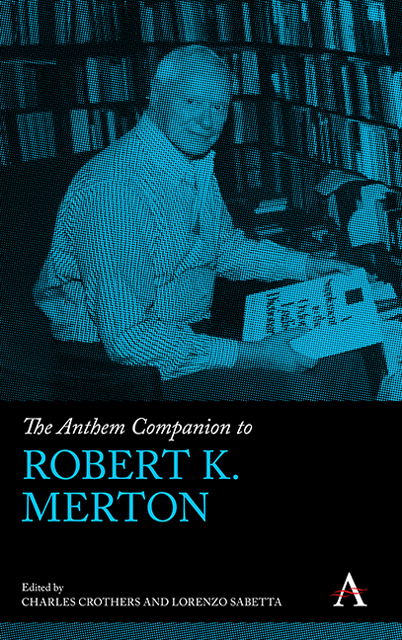Book contents
- Frontmatter
- Dedication
- Contents
- List of Figures and Tables
- Chapter One Introduction: Merton’s Self-Exemplifying Classical Sociological Contributions
- Chapter Two Skeptical Faith, Left Politics, and the Making of Young Robert K. Merton
- Chapter Three Theorist’s Progress: Young Robert K. Merton, 1941–1949
- Chapter Four Taking a Seminar with Merton
- Chapter Five The Development of Mertonian Status-and-Role Theory
- Chapter Six Theory as an Option or Theory as a Must? The Bearing of Methodological Choices on the Role of Sociological Theory
- Chapter Seven “Interviews of a Special Type”: Robert K. Merton and Codification of the Focused Interview
- Chapter Eight Science as a Culture
- Chapter Nine “Providing Puzzles”: Science as Norms and Values
- Chapter Ten A Mertonian Breviary for Cultural Sociologists
- Chapter Eleven The Unpublished Robert K Merton
- Author Biographies
- Index
Chapter Four - Taking a Seminar with Merton
Published online by Cambridge University Press: 10 January 2023
- Frontmatter
- Dedication
- Contents
- List of Figures and Tables
- Chapter One Introduction: Merton’s Self-Exemplifying Classical Sociological Contributions
- Chapter Two Skeptical Faith, Left Politics, and the Making of Young Robert K. Merton
- Chapter Three Theorist’s Progress: Young Robert K. Merton, 1941–1949
- Chapter Four Taking a Seminar with Merton
- Chapter Five The Development of Mertonian Status-and-Role Theory
- Chapter Six Theory as an Option or Theory as a Must? The Bearing of Methodological Choices on the Role of Sociological Theory
- Chapter Seven “Interviews of a Special Type”: Robert K. Merton and Codification of the Focused Interview
- Chapter Eight Science as a Culture
- Chapter Nine “Providing Puzzles”: Science as Norms and Values
- Chapter Ten A Mertonian Breviary for Cultural Sociologists
- Chapter Eleven The Unpublished Robert K Merton
- Author Biographies
- Index
Summary
Robert K. Merton is known to have been a brilliant lecturer; and there exist many accounts of how he literally spellbound his audience at Columbia University (e.g., Marsh 2010; Swedberg 2019). In this chapter, in contrast, the focus will be on his role in the seminar, where he was “a very different person” to cite a former student (Cole 2020a). In what follows, an attempt will be made to explore how Merton conducted seminars, and what he tried to accomplish with this form of teaching. One of Merton's seminars has been selected for special scrutiny: “Selected Problems in the Theory of Organization (Soc 321–322).” It was conducted twice, in 1955–1956 and in 1956–1957. The main reason for choosing this particular seminar is that Merton here presented an interesting innovation that cannot be found in his written work.
The material used for teaching this seminar was a text by Georg Simmel, which was read line by line by Merton, commented on by him, and then generally discussed. The focus was on Simmel's ideas, but besides teaching the students the value of these, Merton was also doing something else, which was perhaps more important. This was to provide the students with a general technique for how to use the theoretical texts of earlier sociologists in their own research. With its help, the students would be able to make use of older insights into the profession and also add to these.
Merton's term for this technique was restatement; and it can be described as taking a passage in a theoretical work (or a theoretical statement in an empirical study), and then tentatively restate it and discuss the new version, in order to come up with new and useful ideas. The “re” in restatement stands not only for the recasting of a theoretical statement, but also for the central role of tradition and cumulation in Merton's view of sociology. In his view, you do not create a new theoretical idea out of nothing. You draw on the existing tradition of insights, which you should also try to add to.
The idea of teaching the students at Columbia a technique for how to theorize in sociology was not new to Merton.
- Type
- Chapter
- Information
- The Anthem Companion to Robert K. Merton , pp. 69 - 88Publisher: Anthem PressPrint publication year: 2022

